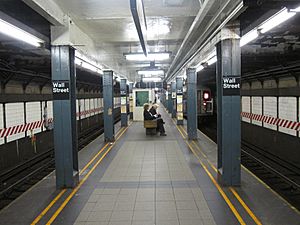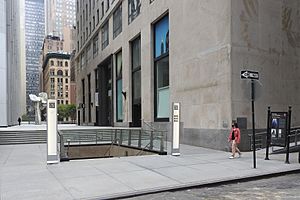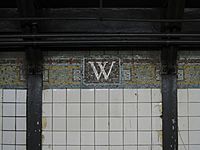Wall Street station (IRT Broadway–Seventh Avenue Line) facts for kids
Quick facts for kids
Wall Street
|
|||||||||||||
|---|---|---|---|---|---|---|---|---|---|---|---|---|---|

148th Street-bound 3 train leaves the station
|
|||||||||||||
| Station statistics | |||||||||||||
| Address | Wall Street & William Street New York, NY 10005 |
||||||||||||
| Borough | Manhattan | ||||||||||||
| Locale | Financial District | ||||||||||||
| Coordinates | 40°42′23″N 74°00′34″W / 40.706311°N 74.009528°W | ||||||||||||
| Division | A (IRT) | ||||||||||||
| Line | IRT Broadway–Seventh Avenue Line | ||||||||||||
| Services | 2 alltimes (all times) 3 allexceptnights (all except late nights) |
||||||||||||
| Transit connections | MTA Bus: BM1, BM2, BM3, BM4, QM7, QM8, QM11, QM25 |
||||||||||||
| Structure | Underground | ||||||||||||
| Platforms | 1 island platform | ||||||||||||
| Tracks | 2 | ||||||||||||
| Other information | |||||||||||||
| Opened | July 1, 1918 | ||||||||||||
| Station code | 333 | ||||||||||||
| Wireless service | |||||||||||||
| Opposite-direction transfer available | Yes | ||||||||||||
| Traffic | |||||||||||||
| Passengers (2019) | 6,910,581 |
||||||||||||
| Rank | 56 out of 425 | ||||||||||||
| Station succession | |||||||||||||
| Next north | Fulton Street: 2 alltimes 3 allexceptnights | ||||||||||||
| Next south | Clark Street: 2 alltimes 3 allexceptnights | ||||||||||||
|
|||||||||||||
|
|||||||||||||
|
|||||||||||||
The Wall Street subway station is a busy stop in the New York City Subway system. It is found in the Financial District of Manhattan, right where Wall Street meets William Street. This station is part of the IRT Broadway–Seventh Avenue Line. The 2 train stops here all the time. The 3 train also stops here, but not very late at night.
Contents
History of Wall Street Station
The Wall Street station was built as part of a big project called the Dual Contracts. This project helped expand the subway system. The Broadway–Seventh Avenue Line first opened on June 3, 1917, but only a small part of it.
The line was extended south to South Ferry on July 1, 1918. That's when the Wall Street station first opened! For a while, it was the last stop for a shuttle train that went to Chambers Street.
On August 1, 1918, a new system was put in place. This connected the two parts of the Broadway–Seventh Avenue Line. After this, trains from the west side of Manhattan could travel all the way through Wall Street. The station remained the end of the line until April 15, 1919. That's when the Clark Street Tunnel opened, allowing trains to travel under the East River to Brooklyn.
Around 1964 and 1965, the platforms at Wall Street station were made longer. They were extended to 525 feet. This was done so that longer trains with ten cars could fit at the station.
In 1995, there was a discussion about closing one of the two Wall Street subway stations. This was because they are very close to each other. The idea was to close either this station or the Wall Street station on the IRT Lexington Avenue Line. However, neither station was closed.
Station Layout and Design
This subway station is underground. It is the last station in Manhattan on the Brooklyn Branch of the Broadway–Seventh Avenue Line. After this station, the subway line goes under the East River through the Clark Street Tunnel to Brooklyn.
The station has one island platform. This means the platform is in the middle, with tracks on both sides. It is quite narrow compared to other subway stations. The station has blue support beams and dark blue floor tiles. Along the walls, you can see small "W" signs made of mosaic tiles. At the north end, where the platform was made longer, the walls say "WALL ST" in black letters on white tiles.
Above the platform, there is a long, narrow mezzanine level. This area has mosaic signs that show you the way to all four station entrances.
Station Exits

The Wall Street station has four main ways to enter and exit.
The first exit is at the northern end of the station. Here, you'll find a customer assistance booth and turnstiles where you pay your fare. A long hallway leads to the basement of a building at 28 Liberty Street. A wide staircase takes you to an unmarked entrance on the east side of Nassau Street at Cedar Street. Even though signs say it leads to Cedar and William Streets, it doesn't go right to that intersection. This entrance is only open on weekdays. It also lets you get to the Broad Street station and the Wall Street/Broadway station.
The second exit is also only open on weekdays. It has turnstiles and a spiral staircase that goes up to Pine Street, near 60 Wall Street. In this hallway, you can see an artwork called Subway Wall by Harry Roseman, which was added in 1993. This exit also has escalators and a wide staircase that lead into the public lobby of 60 Wall Street. This entrance looks like an outdoor subway entrance, even though it's inside a building lobby.
The third exit was the original way to enter the station. It has a staff member working there all the time. This exit has turnstiles and staircases that lead to both northern corners of William and Wall Streets. The entrance at the northeast corner, outside 48 Wall Street, has fancy metalwork and an old sign that says "Interborough Rapid Transit Co-to All Trains."
The last exit is at the south end of the station. It leads to the same intersection as the third exit but is a separate area for paying your fare. A wide staircase from the platform leads to turnstiles. Staircases then go up to both southern corners of William and Wall Streets. The exit at the southeastern corner is outside 55 Wall Street. This exit is open all the time, but it doesn't have a staff member.
There used to be a fifth exit at the southwestern corner of Pine Street and William Street, but it is now closed.
Image gallery
-
An old sign from the IRT at an entrance
-
Entrance #1, from One Chase Manhattan Plaza
-
Part-time entrance #2 is from the lobby of 60 Wall Street
- nycsubway.org – IRT West Side Line: Wall Street
- nycsubway.org – Subway Wall Artwork by Harry Roseman (1990)
- Station Reporter – 2 Train
- Station Reporter – 3 Train
- TheSubwayNut Pictures – Wall Street (2,3)
- MTA's Arts For Transit – Wall Street (IRT Broadway–Seventh Avenue Line)
See also
 In Spanish: Wall Street (línea de la Séptima Avenida–Broadway) para niños
In Spanish: Wall Street (línea de la Séptima Avenida–Broadway) para niños
 | Georgia Louise Harris Brown |
 | Julian Abele |
 | Norma Merrick Sklarek |
 | William Sidney Pittman |











